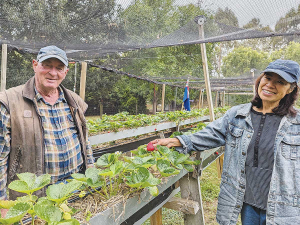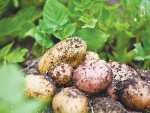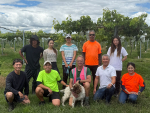Tapper and his wife Aree run Tram Road Fruit Farm at Swannanoa, primarily as a pick-your-own operation, but they also sell from their shop and at a select few farmers’ markets.
There are about 8 acres on their 12 acre block currently planted in fruit, including about 800 cherry trees.
While the cherries have now finished, there’s another paddock which is made up of all kinds of plums, heritage plums, peacherines, nectarines, and peaches.
“There’s a whole range. There’s probably another five or six hundred trees out there. So that’s where the focus is at this time of year,” Tapper told Hort News.
The Tappers also have one-and-a-half kilometres of raspberry canes, where the season is also winding up. The last pickyour- own weekend for raspberries was late January, although they continue to pick a few for the shop.
It’s that broad range of fruit that keeps the business running – even if one variety fails for any reason.
Tapper says cherries had a poor season, first with late frosts that effectively destroyed the entire crop of one early variety.
“Never before have I had cherries frosted after I’ve had a fruit set,” he says.
December rain, and cool damp days into January affected others.
“The last three years we’ve had this confounded weather leading into Christmas that is decimating the cherries,” Tapper told Hort News. “We normally get one wet day in fourteen, not 14 wet days in 15. It’s causing huge damage to the cherries and it shortens the crop.”
If you have only cherries then it’s great if you have a great year for cherries, he explains.
“But that’s only going to be one year in five – the other years are all going to be a disaster of varying degrees,” Tapper adds. “You’ve got effectively two to three weeks to get rid of all of your fruit, while competing with everybody else with the same variety.
He says if the fruit’s a real success that year, the price will be down.
“So, you’ve got all of these things you’ve got to juggle.”
Tapper knows of a Nelson cherry orchardist with 3,000 trees whose entire picking season last year was just three days because of the weather.
“This year, he’s had quite a good season but he needed to because he’s had a pitiful one for the last four,” he adds.
“What we’ve done here is, we’ve tried to work on the basis of a picking and selling period of 12 to 16 weeks.”
At this time of year, the plums are coming in, particularly a sweet Japanese variety called Shiro.
Tapper says he is quite selective at letting people in to pick because they don’t want them taking a whole lot of fruit that’s not ripe. Instead, he will do some early picks himself and only let the public in to clean up the trees when most are ripe.
Paul Tapper, who had previously farmed at Loburn and Geraldine then worked as a real estate agent in North Canterbury, bought the block about 20 years ago when it was part of a 100- acre vineyard. But it was only marginally profitable and he was the first of the individual block owners to pull out the grapes, initially just running sheep instead.
“My attitude when we bought it was ‘if they pay, they stay, if they don’t, they won’t’.”
With his wife Aree, they decided only after the Christchurch quakes to develop their block as an orchard. They had looked at orchards elsewhere but with their house repaired, great neighbours, existing water rights and 6,000 cars a day past the gate they decided to stay put.
While many of their neighbours are lifestylers who work in town, the Tappers decided to “do it properly or not bother”.
“It’s got to be a proper little business, there’s no point otherwise. Because if it’s just a half-hearted bloody thing, it’s a waste of time.”
Managing the strawberries is Aree’s specialist domain.
These are grown in a netting enclosure, in waist-high irrigated troughs to keep the fruit clean and mould-free. They are not hydroponic but grow in a conventionally fertilised soil-like mixture.
This is partly because the Tappers didn’t like the idea of a rooting medium that “had no fertility in it” and was difficult to dispose of at the end of its useful life.
After about three years, the plants and soil can all just be composted.
Although strawberries have the longest season of all the fruit, they were off the menu when Hort News visited because Aree was holding them for a large wedding order.
“The flavour we get out of the strawberries is fantastic,” she explains.
PYO Challenges and Rewards
Running an orchard as a pick-your-own operation has its challenges – including managing without chemical sprays.
Tapper doesn’t want to have to close off sections of any variety because of a withholding period on a neighbouring variety.
“We don’t do any spraying of any consequence and so people really like that.
“Like any other orchard we’re trying to sell fresh fruit but we’re trying to sell something else. We’re trying to sell an experience."
But Tapper has developed a keen sense of who is there to abuse the system.
“Some people think it’s a game. They think that it’s a challenge to come and see how much they can thieve off you,” he told Hort News. “Go out there and have a bloody good feed and come back out with nothing.”
Tapper says someone recently turned up saying they want to use their own tiny container, good for maybe 200g of raspberries – but if that was really all they wanted they could just buy already picked fruit from the shop.
“If you’re going out in the orchard, you know, I’d expect that you should be picking a minimum of a half a kilo per person – absolute minimum. And if you can’t do that, why are you here?” he says.
“We’re quite happy for you to taste them, but you don’t have the right to come here and have a picnic.”
















